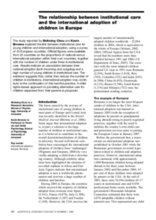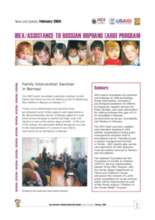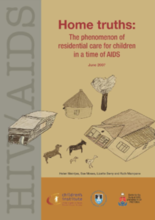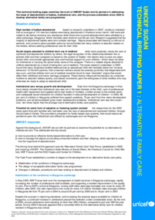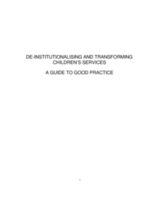Displaying 681 - 690 of 772
In this meta-analysis of 75 studies on more than 3,888 children in 19 different countries, the intellectual development of children living in children's homes (orphanages) was compared with that of children living with their (foster) families.
Assesses the causes and realities of children living in institutions in Guatemala with recommendations for systemic reform.
Explores causal relationship between increased international adoption and increase in institutional care of children in Europe.
Update on all recent seminars and activities relevant to child welfare reform and deinstitutionalization in Russia
Provides insight into the situation of children outside parental care in South Asia, gaps in legislation, capacity, and services, with reference to national and international legal instruments.
The study reported by Shihning Chou and Kevin Browne explored the link between institutional care for young children and international adoption, using a survey of 33 European countries. The evidence suggests that, rather than reduce the number of children in institutions, international adoption may contribute to the continuation of this harmful practice. A child rights-based approach to providing alternative care for children separated from their parents is proposed.
A report on residential care in South Africa in the context of AIDS and an under-resourced social welfare sector.
Examines the work of UNICEF Sudan and its partners in addressing the issue of abandonment of babies, institutional care, and the process undertaken since 2003 to develop alternative family care programmes.
A clear, concise, and evidence-based summary of the effects of institutional care on children. Identifies key steps to transforming children's services to promote alternative care. Links to training resources at European Union Daphne Project website.
Examines practice of using institutional care for children in poverty and recommends alternative responses to maintain families.


